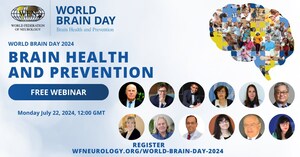"When we discuss brain health and prevention, we're safeguarding our blueprint for the future. It's not merely about reacting; it's about actively cultivating a culture of prevention for neurological diseases," said Prof. Wolfgang Grisold, President of WFN. "Our dedication to preventing neurological disorders is the cornerstone of our resilience for tomorrow."
While there are no definitive cures for many neurological disorders, understanding and addressing risk factors can significantly alleviate this burden. A 2021 Global Burden of Disease Study revealed that over 3.40 billion individuals suffered declines in nervous system health, resulting in 11.1 million deaths attributed to related conditions.
The study's findings encompass a range of neurological conditions, including stroke, Alzheimer's disease, other dementias, epilepsy, multiple sclerosis, Parkinson's disease, encephalitis, meningitis, and idiopathic intellectual disability.
The study found that interventions such as reducing lead exposures, smoking cessation and managing glucose levels, could all yield substantial results in reducing the disease burden, in addition to lifestyle modifications like sleep, stress, diet and exercise.
This underscores significant public health ramifications and the urgent need for awareness around preventive measures, making WBD 2024 an essential global health initiative based on five key points.
- Neurological disorders are preventable through early detection and effective management.
- Global education on prevention for brain health is imperative.
- Socioeconomic status or geographic location should not be barriers to prevention.
- Healthcare professionals, researchers, and policymakers play pivotal roles in addressing the global neurological needs.
- Recognizing brain health as a fundamental human right is at the core of our mission.
"This World Brain Day is a chance for us to unite and advocate for our present and future," says Prof. Tissa Wijeratne, World Brain Day Co-Chair. "Through advocacy and policy changes, our collective voices will spark a worldwide movement for better preventive healthcare and pave the way for a brighter, healthier tomorrow."
The WFN is honored to be joined in this initiative by representatives of the World Health Organization (WHO) Brain Health Unit as Guests of Honor for WBD 2024. WHO's presence underscores the importance of the Intersectoral Global Action Plan on epilepsy and other neurological disorders (IGAP), and its implementation worldwide.
"As we approach World Brain Day 2024, let's come together to support brain health and prevention. Beyond just words, it's about taking meaningful action," says David Dodick, MD, Emeritus Professor of Neurology at Mayo Clinic and World Brain Day Co-Chair. "Together, we're shaping a future where prevention isn't just a concept but a way of life, ensuring that the generations to come inherit a world that prioritizes neurological disorders."
The WBD 2024 committee is formed by representatives from each of the WFN Regional Neurological Associations:
- American Academy of Neurology (AAN)
- African Academy of Neurology (AFAN)
- Asian and Oceanian Association of Neurology (AOAN)
- European Academy of Neurology (EAN)
- Pan-American Federation of Neurological Societies (PAFNS)
- Pan Arab Union of Neurological Societies (PAUNS)
Established by the WFN in 2014, World Brain Day continues to serve as a catalyst for public awareness on various neurological health topics each year. Mark your calendars for July 22—a day dedicated to celebrating brain health and promoting prevention. Visit wfneurology.org/world-brain-day-2024 for more information on how to join WBD. Individuals, societies and countries are encouraged to host their own activities and amplify their voices on social media using hashtags such as #WorldBrainDay, #WBD2024, and #BrainHealthandPrevention.
About the World Federation of Neurology
With support from its 124 national neurological Member Societies, the World Federation of Neurology fosters quality neurology and brain health worldwide by promoting neurological education and training, with an emphasis on under-resourced areas of the world. As a non-state actor in official relations, WFN supports the World Health Organization (WHO) efforts to give everyone an equal chance to live a healthy life. With Member Societies around the globe, WFN unites the world's neurologists to ensure quality neurology and advocate for people to have better brain health. Learn more about the World Federation of Neurology at wfneurology.org.
Media Contact:
Ryan Pollock, Yakkety Yak
[email protected]
Photo - https://mma.prnewswire.com/media/2406226/FINAL_WFN_2024_WBD_Banner_HIGH_RES.jpg
Logo - https://mma.prnewswire.com/media/2406281/WBD_2024_Logo.jpg







Share this article